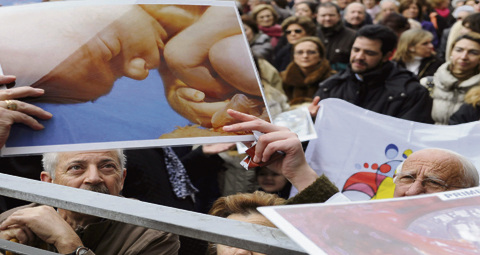October 23 | ![]() 0 COMMENTS
0 COMMENTS ![]() print
print

Compassion needed on abortion issue… for pro-life advocates
LIVING IN Scotland will be an interesting experience for those who still think they are living in an enlightened and diverse country where all faiths and traditions are respected and treated equally.
The decision by David Mundell, the Scottish Home Secretary, to devolve abortion law to Holyrood has already provided a taste of what it is to profess to be Christian in modern Scotland. John Deighan, the chief executive of SPUC (among others including myself) has been targeted for stating the belief that the unborn child is 100 per cent human and is therefore entitled to the protection of society.
On Monday I wrote a column for the independence-supporting newspaper The National in which I attempted to argue that defending the human rights of unborn children, the most vulnerable people in the world, was not an extreme position. Some of the responses were priceless and made me realise that in Scotland you are allowed to profess the Christian faith up until the point that it begins to diverge from the atheistic orthodoxy that informs the political philosophy of civic Scotland whether you be left or right, SNP, Labour or Conservative. It is now not enough simply to disagree with Christianity, you must also question the right of Christians to have a voice in modern Scotland.
“The normally rational Kevin McKenna goes quite mad. Oppose abortion on moral grounds? Fine, don’t have one.”
“There is no rational debate with people who think they have a right to control a woman’s body.”
“The last thing we want is the religious few determining our lives.”
John Mason, the Christian and much-respected SNP MSP for Glasgow East, moved a reasonably-worded motion at Holyrood that sought to strike a balance between protecting an unborn child’s rights and protecting a woman’s sexual and reproductive rights. This was denounced as an ‘appalling anti-choice motion’ by someone called Gary Dunion while an SNP supporter calling himself Argyll Atheist on Twitter said that Mr Mason’s views were ‘primeval’ and ‘an absolute disgrace to my party.’
So let me state once more, and for the record, I am unequivocally opposed to abortion on several grounds, not the least of which is that an unborn child’s right to life is equal to its mother’s. It’s a reasonable position, whether you agree with it or not. Yet the militant atheists who have a stranglehold on what passes for progressive thought in Scotland are already seeking to portray such a view as unacceptable and further proof that all vestiges of Christianity ought to be expunged from civic Scotland.
We have seen something of the same attitude whenever any Christian breaks cover on social media or on television and radio to state a belief in the traditional concept of marriage or that euthanasia is wrong or that some forms of stem cell research are nothing more than the establishment of a human spare parts workshop. A fundamental belief in the dignity of human life underpins each of these and brings them all together. And with that comes a warning that human beings whose health or physical and mental conditions render them more vulnerable than the rest of us will be at risk in a society where human dignity can so easily be legislated away.
Last month, I conducted an interview for the Scottish Daily Mail with the Reverend David Robertson, the outspoken but articulate Moderator of the Free Church of Scotland. For this I was condemned by some gay rights activists for promoting a man who hates gay people. The Reverend Robertson is nothing of the sort and simply believes that marriage is a civic and sacred contract entered into by a man and a woman. To hold such a position, whether you agree with it or not, is entirely reasonable. But in the world occupied by Patrick Harvie, full-time atheist and part-time Green Party leader, and his acolytes such views do not deserve even to be uttered in modern, enlightened Scotland. In the months and years ahead it won’t be tanks that are being parked on the lawns of those who oppose abortion or want to see the 24-week time limit reduced it will be fiery crosses.
The forces of militant and intolerant secularism deliberately distort and misrepresent the views of Christians and we will see this as the abortion debate rages in Scotland once more. Yet the language and tactics of some Catholics on the abortion issue can also be uncharitable and offensive.
As Christians we need to understand that many women who opt to terminate their pregnancies do so in a state of some desperation. Very often they are encountering deprivation in their lives and may also be the victims of violence. Nor do I like the phrase ‘lifestyle abortion.’ This suggests a callousness and indifference to life on the part of some women who feel, for whatever reason, that a child might be an unacceptable burden to them. It’s not for us to judge the motivation of these women. Instead, we must simply attempt, in a spirit of Christian charity and compassion, to convince these women that bringing a human life into the world can never be so inconvenient that the only solution is to destroy it.
It’s not enough to begin to care about a woman’s mental and physical welfare only when she is considering an abortion. What have we as Christians to say about the squalor and deprivation that are the everyday experience of millions of our fellow citizens?
More than 250,000 Scottish children already live in poverty and it is entirely understandable why a pregnant woman whose family lives in such conditions would contemplate an abortion. If we, as Christians remain indifferent to their poverty then we will have no right to preach to them about whether or not to have an abortion.
Mr Deighan has only recently been appointed as chief executive of SPUC in Scotland. He will bear a great deal of responsibility over the next two years or so. He will be a high profile advocate of the unborn child. I pray that he carries out that task in a spirit of compassion and understanding.










